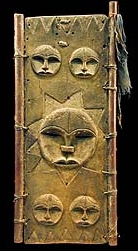  |

Unit 12 |

English 203:
Literature of
the NonWestern World
|
Questions:
Chat:
-
Western
literature almost always stereotypes native religious "types" (shamans,
oracles, ritualists) as fakes, frauds or superstitiously ignorant.
Compare the oracle Agbala, who tells Unoka to "go home & work like
a man" (2943) with the missionaries (Mr. Kiaga, e.g.).
-
Responding
to a white missionary, a tribal says, "You told us . . . there was only
one god. Now you talk about his son." The, "The missionary
ignored him & went on to talk about the Holy Trinity" (3003).
What do such scene imply about the British? About missionaries?
-
Another
postcolonial
writer, V.S. Naipaul (an ethnic Indian who grew up in Trinidad) is a highly
accomplished writer who is very controversial for espousing much of the
colonialist view (i.e. the British 19th c. view). When the colonial
subject is Trinidad Naipaul voices the usual moral objection. When
the object is India, he strangely says that "18th c. India was squalid.
It invited conquest" (An Area of Darkness 213). Is there any
sense in which this is true of Nigeria, that somehow it invited conquest?
-
Would
yin
tactics have worked? This would mean accepting the British program
in regard to schools, the English language, jobs, & law. Yin
tactics would mean toleration of mission propaganda & British arrogance
but keeping indigenous religious beliefs & values in tact. This is
arguably the pattern of Japanese accommodation with the West & perhaps
of India (ef. Gandhi's passive resistance which sought to shame the British
for not living up to the ideals that they supposedly were there in India
to teach).
-
What
should of Okonkwo done?
Short
Answers:
When you finish answering the questions, go to
the next page:





